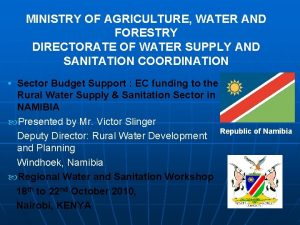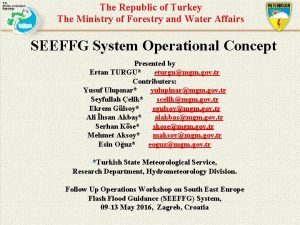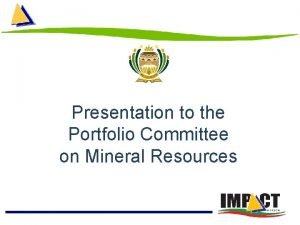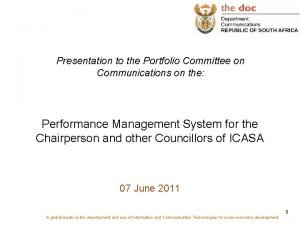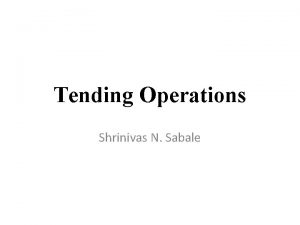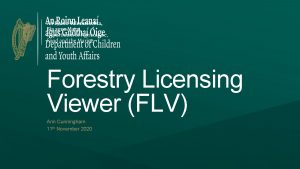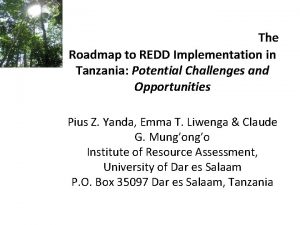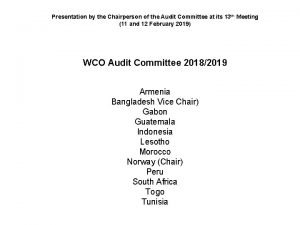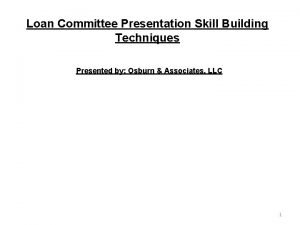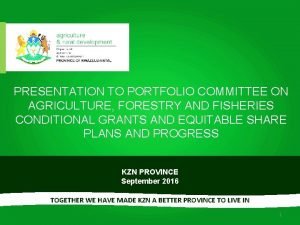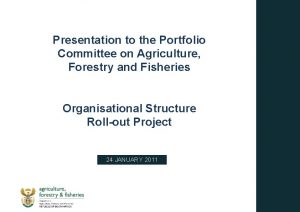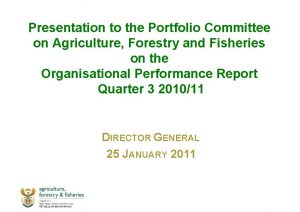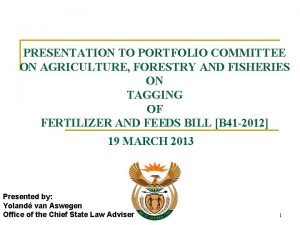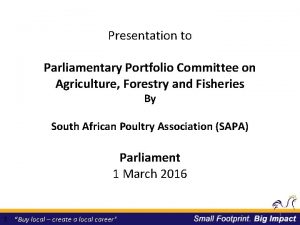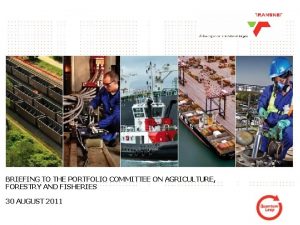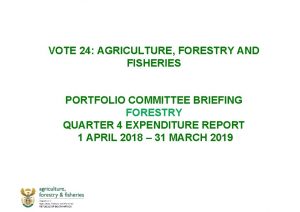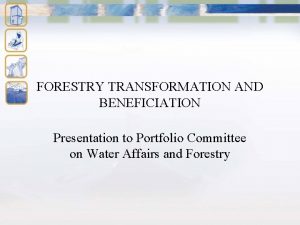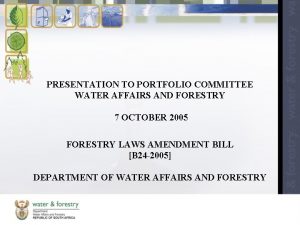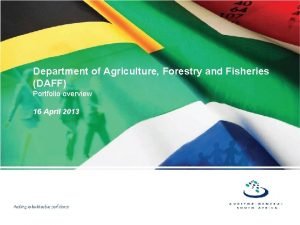Presentation to the Portfolio Committee on Agriculture Forestry
















































- Slides: 48

Presentation to the Portfolio Committee on Agriculture, Forestry, and Fisheries: 9 July 2009

Index Land Bank in context State of the Bank in 2008 Consequences of the above The turnaround strategy Turnaround progress report Development Conclusion Annexure - Development

Land Bank in Context

The Land Bank Act 15 of 2002 Section 1. 2 (1) mandates the bank to promote, facilitate, and support the following: • • • Equitable ownership of agricultural land Agrarian reform, land distribution or development programmes Land access for agricultural purposes Agricultural entrepreneurship Removal of the legacy of past racial and gender discrimination in the sector • Rural development and job creation • Commercial agriculture, and • Food security

Mandate has not been achieved Reasons for failure to achieve mandate objectives: • • • Instability in leadership and management Misalignment between Board and Management April 2007 to June 2008: 6 CEO’s & 4 Chairs of Board Executive management (12) only 4 permanent At senior management level 39 positions with 23 vacant

State of the Bank in 2008

Audit findings Damning Audit findings (192 page report) in the following areas (incl. ): • • • Weaknon existence of controls Land for development Breakdown in payroll system Breakdown in procurement system Deteriorating IT environment (personnel and systems) Poor records of audit trails Poor monitoring and collection of arrear loans Non-compliance with legislation Funds under administration Numerous special investigations of suspicious fraudulent transactions

Critical Vacancies (July 08) Vacant posts • • GM Credit GM Risk CFO GM Operations Credit Head – Corporate Banking Head – Internal Audit Head of Retail Senior Manager Finance

Employee Relations (July 08) Seventeen (17) disciplinary cases in total Cases Finalized = 13 Nature of misconduct ranged from the following: • Dishonesty • Misrepresentation • Gross Insubordination • Negligence/ Gross Negligence • Fraud In progress 4 and nature of misconduct ranged from: • Fraud and or misrepresentation • Gross Negligence • Contravening provisions of PFMA

State of the Bank: Consequences

Funding and lending activities Bank funding • Equity – (R 1 bn) • Injection – (R 700 m) • Investor funds – (R 13 bn) Surplus cash • Commercial banks Bank on lends funds • Retail clients (R 3. 2 bn) • Commercial clients (R 10. 2 bn) Profit sufficient to fund Profit = Lending rate – cost of funds • Risk • Cost of operations • Growth in capital

Funding and lending activities Investor funding Dependent on LB risk being acceptable Risk profile depends on: Investor confidence Sustainable return on investment Investor confidence dependent on Adequate return on investment Future sustainability Low probability of default If positive investor confidence Loan book quality If good quality Positive investor confidence - more funding Margins realised Loan repayments Book grows If bad quality Loan impairments Attract more funding available to on lend Losses Increased profits - grows capital Negative investor confidence withdrawal of funding Less dependency on shareholders If negative investor confidence Call up funding If insufficient cash surplus, market panic Market panic - run on the bank (investors recall funds) Bank insolvent - government rescue required

Declining liquidity 2 500 Monthly Cash Balances from March 07 to March 09 (R'm) 2 000 1 500 Cash 1 000 500 Mar 07 Apr May Jun Jul Aug Sep Oct Nov Months Dec Jan 08 Feb Mar Apr May Jun Jul Aug

Declining loan book Gross loans and advances (R’bn) R 18, 0 R 17, 4 R 17, 5 R 17, 4 R 17, 0 R 16, 4 R 16, 5 R 15, 9 R 16, 0 R 15, 5 R 15, 4 R 14, 9 R 15, 0 R 14, 5 R 14, 0 R 13, 5 FY 04 FY 05 FY 06 FY 07 FY 08 FY 09

Increasing NPL’s Non-Performing Loans (R’bn) R 4, 5 R 4, 0 R 3, 5 R 3, 0 R 2, 5 R 2, 0 R 1, 5 R 1, 0 R 0, 5 R 0, 0 R 1, 1 R 1, 9 R 2, 7 R 3, 4 R 3, 9 FY 04 FY 05 FY 06 FY 07 FY 08 FY 09 NPL Value Linear(NPL Value)

Cost of NPL’s R 500 Cost of NPL's (R'm) R 450 R 400 R 350 R 300 R 250 R 200 R 150 R 100 R 50 R 94 R 148 R 234 R 363 R 472 FY 05 FY 06 FY 07 FY 08 FY 09

The Turnaround Strategy Government had to intervene to restore confidence and address going concern uncertainties

Land Bank turnaround strategy - timeframes

Phases of the turnaround strategy - definition Clean-up • • • The clean-up process involves addressing audit qualifications and related issues: 7 qualifications 12 other matters Management letter (185 pages) Conditions of government guarantee Scopa resolutions Stabilisation • • • The stabilisation efforts are intended to stabilise the bank financially and functionally: HR IT Liquidity Balance sheet Cost to income LDFU Sustainability The sustainability initiative aim to normalise operations and enhance the banks focus on its core business of development mandate

Turnaround Progress Report

Progress report – clean-up • Dealt with 7 qualifications • Dealt with 12 other matters of emphasis • Dealt with management letter issues v Awaiting Auditor General to finalise the audit

Progress … Stabilisation (HR) • 5 of 8 executive positions occupied • Interviews for 3 more in 1 to 2 weeks time • 68 critical positions filled

Progress … Stabilisation (IT) • HR and Finance SAP configuration fixes completed • Decision taken that SAP implementation is best for LB • Appointed CIO regarded as a SAP expert • Downsizing SAP as automated core banking solution

Progress … Stabilisation (funding and liquidity)

Progress. . . Stabilisation (balance sheet) Intensify efforts to recover non-performing loans to improve the balance sheet Key performance indicator Actual (unaudited) Collection on non-performing loan book Collected R 541 million Maximise corporate finance unit (CFU) pre-legal recoveries Recovered R 157 million Maximise pre-legal retail recoveries Recovered R 376 million Maximise LDFU recoveries R 14. 7 million recovery. Guarantee of R 53 million in place. R 130 million letters of intent.

Progress. . . Stabilisation (balance sheet) Non Performing Loans (Rbn) R 4, 0 R 3, 5 R 3, 0 R 2, 5 R 2, 0 R 1, 5 R 1, 0 R 0, 5 R 0, 0 R 1, 1 R 1, 9 R 2, 7 R 3, 4 R 3, 6 FY 04 FY 05 FY 06 FY 07 FY 08 FY 09 NPL Value Excluding LDFU Linear(NPL Value)

Progress. . . Stabilisation (Increasing repayments by development clients)

Progress. . . Stabilisation (capital improving) Equity expected to improve

Progress. . . Stabilisation (improving cost-to-income) 110, 0% Cost-to-income ratio (%) 100, 0% 90, 0% 80, 0% 70, 0% 60, 0% 50, 0% 40, 0% FY 05 FY 06 Improvements due cost reduction FY 07 FY 08 FY 09

Progress. . . Stabilisation (cost reductions) Marketing costs 30 Professional fees 12 Personnel costs 12 Travel and other costs 6 60

Progress. . . Sustainability (loan book stabilising)

Development as core to the business

Development Area of Intervention Progress Report Meet objectives of the mandate of the bank Development adopted as core to the business of the bank Formalisation of development policy Policy approved Mainstreaming of development Development impact parameters approved Implementation of development pilot projects Projects being considered for approval

Development financial targets Commercial Development 2010 Retail Development Corporate Clients Development Total Development 200, 000 250, 000 450, 000 2011 250, 000 600, 000 250, 000 1, 100, 000 2012 250, 000 120, 000 250, 000 1, 700, 000 Total Growth 500, 000 200, 0000 750, 000 3, 250, 000

Conclusion • Shareholder approval of the turnaround strategy and development policy led to the approval of R 3. 5 bn guarantee • To maintain the benefits of the turnaround the following needs to be done: • Grow the loan book • Maintain low level and increase recovery of non-performing loans • Maintain a sustainable level of cost-to-income ratio • Preserve capital (balance sheet) • Implement the development mandate

Conclusion (continued) • Accordingly Land Bank is undertaking the following projects: • Appropriate pricing model • Appropriate credit model • Appropriate products for the target market niches (specifically rural development) • Review of branch network • Alignment with Provincial government strategies

Thank you

Annexure - Development

Objective and purpose Ø Ø The objective of the Bank is to entrench development as core to its businesses The purpose of the policy is to operationalise development by: • • 39 Generating thrusts to mainstream development within the Bank Facilitating transformation programmes in the Bank Introducing and supporting innovation in agriculture Building a foundation for sustainable agricultural development

Problem statement Ø Banks failure to establish policy to enable the following: • Definition of development • Development monitoring • Development quantification Ø Historical absence of systematic management of risk • Unstructured development financing, and • Lending Ø Need for Policy • Tool to enable bank to implement development mandate appropriately Ø Objective of policy • To entrench development as core to the business 40

What informs the Policy Ø Ø Ø Ø Ø Political imperatives in the sector Deregulation of the sector in 1994 Strauss Commission recommendations Amended 2002 Land Bank Act NT review of DFI’s Need to address market failure in the sector Bank risk appetite Alignment with shareholder objectives Need to define target markets, develop products and procedures Need for a policy to guide the bank in positioning its operations within predetermined risk Ø The above require the bank to realign its products, services, processes, infrastructure, and capacity 41

Objectives of realignment Ø Ø To meet expectations of shareholder To address the financial market failure To prioritise development as core to business To manage expectations for innovative products against the bank’s sustainability Ø To inculcate the culture of responsible lending Ø To address expectations for the Bank to provide non financial services Ø To re-define Land Bank development products 42

Operational policy on development Ø Strategic goal and market position • The Land Bank to be a fully integrated agricultural development finance institution with a regional footprint that promotes, facilitates and supports agricultural and rural development. 43

Target market space Ø The Bank has identified market space for development which includes: • • Financing agri related activities Support to land reform programmes Spectrum from individuals to cooperatives From empowerment clientele to commercial (emerging, commercial) • Support for innovative ideas to enticing commercial agriculture into development 44

Identified target market niches (TNMs) Ø Target market space be serviced through TNMs (see funding presentation for details): • Indirect funding of emerging entrepreneurs via direct funding of large corporate clients (priority) • Indirect funding of emerging entrepreneurs via the direct funding of newly established co-operatives as well as via existing commercial infrastructure (priority) • Direct funding of emerging entrepreneurs, particularly groups such as trusts and communities, via the funding of inter alia enterprises that utilize land now available under the national land reform initiative (priority) 45

Identified target market niches (TMNs) • Direct funding of the participation by emerging entrepreneurs in commercial primary or secondary agriculture (such as food processing) • Direct funding of the acquisition by emerging entrepreneurs of shares in existing and/or expanding enterprises • Direct funding and/or support of focused rural development enterprises or initiatives 46

Development impact parameters (DIP’s) Ø Market niche or delivery products to be assessed on the basis of DIP’s (see mainstreaming presentation for details) Ø DIP’s include among others: • Development of emerging entrepreneurs • Generation of employment opportunities • Access to land • Creation of BEE ownership • Creation of BEE management • Creation of WYD participation • Alleviation of poverty in high priority regions • Contribution to food security • Introduction of innovative ideas in agriculture Ø This to be reported to the Board Audit Committee 47

Proposed funding model to support development 48
 Ministry of agriculture, water and forestry directorates
Ministry of agriculture, water and forestry directorates Mendel university of agriculture and forestry
Mendel university of agriculture and forestry Oviposition
Oviposition Republic of turkey ministry of agriculture and forestry
Republic of turkey ministry of agriculture and forestry Portfolio committee
Portfolio committee Portfolio committee on mineral resources and energy
Portfolio committee on mineral resources and energy Portfolio committee on basic education
Portfolio committee on basic education Portfolio committee on communications
Portfolio committee on communications Portfolio committee on basic education
Portfolio committee on basic education Portfolio committee on higher education
Portfolio committee on higher education Mission statement examples for students
Mission statement examples for students Tending operations in forestry ppt
Tending operations in forestry ppt Forestry license viewer
Forestry license viewer La county fuel modification
La county fuel modification Chapter 11 forestry and resource management
Chapter 11 forestry and resource management Chapter 11 forestry and resource management
Chapter 11 forestry and resource management Forestry io roadmap
Forestry io roadmap Careers related to forestry
Careers related to forestry Economic importance of forest
Economic importance of forest Lidar
Lidar State and private forestry
State and private forestry Difference between agroforestry and community forestry
Difference between agroforestry and community forestry Miisun forestry
Miisun forestry Coop
Coop Forestry tep
Forestry tep State forestry administration
State forestry administration Close-to-nature forestry
Close-to-nature forestry P&t committee presentation
P&t committee presentation Audit committee presentation
Audit committee presentation Loan committee presentation
Loan committee presentation Swe finance
Swe finance Product portfolio presentation
Product portfolio presentation Hình ảnh bộ gõ cơ thể búng tay
Hình ảnh bộ gõ cơ thể búng tay Ng-html
Ng-html Bổ thể
Bổ thể Tỉ lệ cơ thể trẻ em
Tỉ lệ cơ thể trẻ em Voi kéo gỗ như thế nào
Voi kéo gỗ như thế nào Glasgow thang điểm
Glasgow thang điểm Hát lên người ơi
Hát lên người ơi Các môn thể thao bắt đầu bằng từ đua
Các môn thể thao bắt đầu bằng từ đua Thế nào là hệ số cao nhất
Thế nào là hệ số cao nhất Các châu lục và đại dương trên thế giới
Các châu lục và đại dương trên thế giới Công thức tính thế năng
Công thức tính thế năng Trời xanh đây là của chúng ta thể thơ
Trời xanh đây là của chúng ta thể thơ Cách giải mật thư tọa độ
Cách giải mật thư tọa độ Làm thế nào để 102-1=99
Làm thế nào để 102-1=99 độ dài liên kết
độ dài liên kết Các châu lục và đại dương trên thế giới
Các châu lục và đại dương trên thế giới Thơ thất ngôn tứ tuyệt đường luật
Thơ thất ngôn tứ tuyệt đường luật
